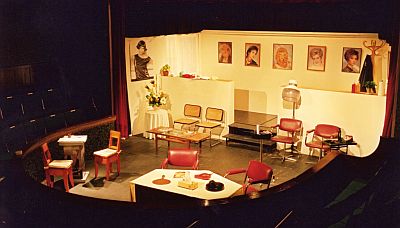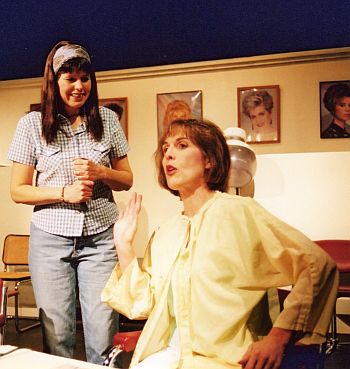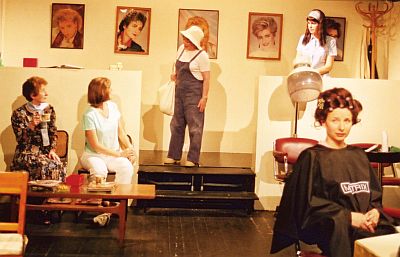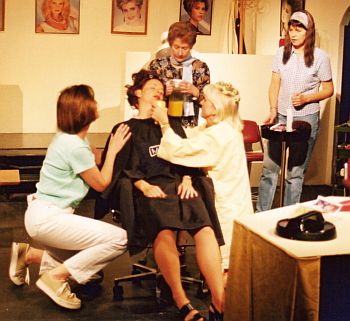Steel Magnolias
STEEL MAGNOLIAS by Robert Harling
One of the problems in presenting a play such as Robert Harling’s Steel Magnolias is that it is so well known as a film - one, indeed, that won an Oscar for Sally Ann Field. Interestingly, though, the play works even better on stage than it does on celluloid: the relationships between the six principles are heightened by remaining within the confines of the set (Truvy’s Hairdressing Salon), and the husbands, boyfriends, brothers and sisters of the principles live more vividly in our imagination that they do by being presented in ‘walk-on’ parts.

The play was ideally suited to the very intimate nature of Pateley Playhouse: it was as if the walls of the salon had been removed, and the audience were part of the clientele. A very strong set, making excellent use of the unusual space, was used to good effect to highlight the moments of drama and emotion that ran throughout the play. Great credit goes to Derek Howard and his excellent back-stage team for providing one of the best sets seen in the Playhouse in recent years.
Miike Thorne’s direction was in evidence throughout the play: there wasn’t a wasted motion or gesture – every move had a purpose, and invariably underlined the flow of the narrative. He’d also produced six excellent performances from six highly accomplished actresses – the play is unusual in that the six parts are all very strongly written, and there’s no room for a weak performance. Mike created the atmosphere which allowed supportive, team acting from them all.
And he’d worked with them on characterisation and dialogue; although only one of the six was a native-speaking American, they had all worked with a Southern American to produce very creditable Louisiana accents. The result was six very different, well-drawn characterisations.


Christine Ward played Ouiser with relish: a curmudgeonly – though rich – woman, she was the archetypal elderly grouch, and Christine’s interpretation displayed her talent for comedy to the full, while allowing us the occasional glimpse of a softer side beneath the crust. This required, and received, very skilful playing.

The central story revolves around M’lynn and her daughter Shelby. As the young, vibrant, and sunny Shelby, Debbie Forsyth undertook one of the most difficult challenges for any actress – to be nice! – and produced a sincere and affecting performance. As we gradually learn of her diabetes, and her wish to have children, the conflict between Shelby and her mother M’lynn, played by Jo Jefferson, provided some tense and emotionally-charged moments. The two actresses totally convinced, and swept the audience along with them.
It’s easy to write off this play as a ‘chick-flick’, but, as with all well written pieces, it has much to say. It’s a well written, well-constructed work, which could hardly have been better performed than it was at Pateley Playhouse. A thoroughly satisfying production, and a triumph for Mike Thorne’s first major production at the Playhouse.
